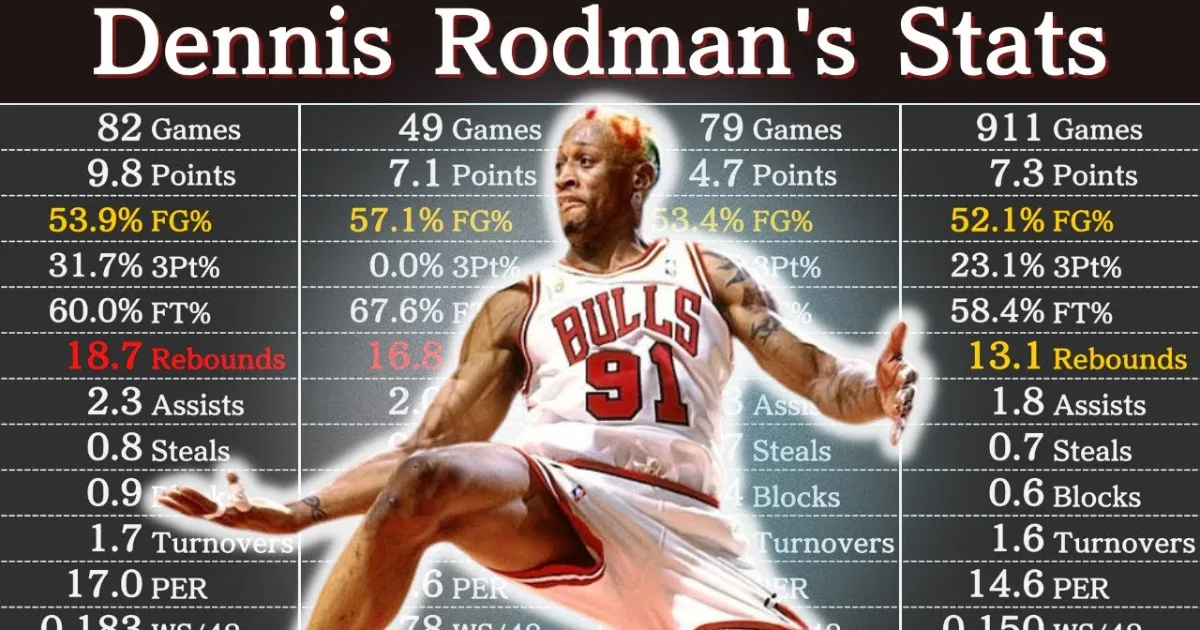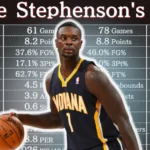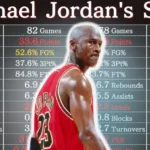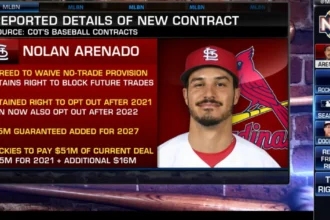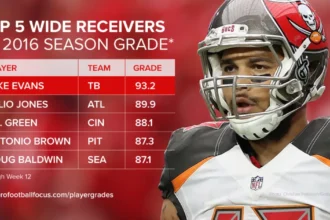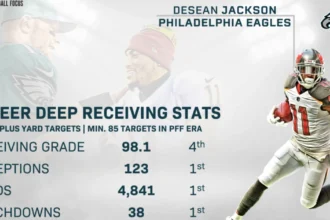Hey there, basketball fans—or maybe you’re just curious about that wild-haired guy from the ’90s who seemed more like a rock star than a pro athlete. Either way, welcome to the story of Dennis Rodman Career Stats. If you’ve ever watched a game and thought, “Man, that rebound was insane,” chances are you’re thinking of him. Rodman wasn’t the guy dropping 30 points a night like Michael Jordan. No, he was the hustle machine, the defensive wizard, and yeah, the rebounding beast who grabbed more boards than anyone could dream of. In this article, we’re diving deep into Dennis Rodman’s career stats—those numbers that tell the tale of a Hall of Famer who won five NBA championships and became a legend. We’ll keep it simple, fun, and easy to follow, whether you’re a kid just discovering hoops or a grandparent reminiscing about the Bad Boys era. Grab a snack, settle in, and let’s bounce through his journey.
The Early Days: From Underdog to NBA Hopeful
Picture this: It’s the late 1970s in Dallas, Texas. A young Dennis Rodman is tall and skinny, more interested in cooking and hanging with friends than dominating on the court. He didn’t even pick up a basketball seriously until he was 19—late bloomer alert! Standing at 6’7″ (he’d later claim 6’8″, but who’s counting?), Rodman headed to Cooke County Junior College in Texas, where he started turning heads with his relentless energy.
By 1983, he transferred to Southeastern Oklahoma State University, a small NAIA school. There, he blossomed into a rebounding monster, leading the nation in boards during his junior and senior years. In 1984, he dropped 23.5 rebounds per game—numbers that would make even Wilt Chamberlain raise an eyebrow. Scouts took notice, and in the 1986 NBA Draft, the Detroit Pistons snagged him in the second round, 27th overall. It wasn’t flashy, but for Rodman, it was the start of something epic. Little did anyone know, this quiet kid from the projects would become the heart of the “Bad Boys” Pistons, a team known for their gritty, in-your-face style.
Rodman’s early stats weren’t eye-popping offensively—he was more about the dirty work. But that hustle? It was already shining through. As a rookie in 1986-87, he averaged 6.5 points and 4.8 rebounds in just 20 minutes off the bench. Not bad for a guy learning the ropes. By his second year, he was up to 6.3 points and 5.7 rebounds, helping the Pistons reach the Eastern Conference Finals. Fans started calling him “The Worm” for how he slithered through crowds for loose balls. It was clear: This guy was built for the grind.
The Pistons Era: Building a Dynasty with Defense
Ah, the Detroit Pistons from 1986 to 1993—that’s where Rodman truly came alive. Under coach Chuck Daly, the Bad Boys were villains to some and heroes to others. They played tough, trash-talked, and won. Rodman fit right in as the enforcer, often assigned to shut down the opponent’s star. Remember those battles with Larry Bird or Magic Johnson? Rodman made them work for every bucket.
His stats started exploding in year three (1988-89). He averaged 8.3 points, 9.4 rebounds, and 1.3 steals in 27 minutes, earning his first All-Defensive Team nod. The Pistons swept the Lakers in the Finals that year—Rodman’s first ring. But it was the 1989-90 season that put him on the map as a defensive phenom. He won NBA Defensive Player of the Year, averaging 8.9 points and 9.4 rebounds while holding opponents to miserable shooting percentages.
Then came the rebounding dominance. In 1990-91, Rodman broke out with 18.7 rebounds per game—yes, you read that right. That’s Wilt-level stuff, but Rodman did it in an era of faster play and bigger bigs. He led the league that year and snagged his first rebounding title, totaling 1,530 boards (a mark untouched since Chamberlain). His scoring dipped to 8.8 points, but who cared? He was the anchor. The Pistons repeated as champs in 1990, and Rodman grabbed 18.3 rebounds per game in the playoffs.
Over his Pistons tenure, Rodman’s per-game averages settled into a beautiful rhythm: about 8-9 points, 13-15 rebounds, and elite defense with 1.5 steals and 0.6 blocks. He made seven All-Defensive Teams and two All-Stars (1990 and 1992). Fun fact: In a 1992 game against Indiana, he yanked down 34 rebounds—a career high that’s still jaw-dropping. By 1993, though, the Pistons’ dynasty faded against Jordan’s Bulls. Rodman, ever the free spirit, moved on to San Antonio, but his Detroit legacy? Untouchable. He was the glue that made the Bad Boys unbreakable.
The Wandering Years: Spurs, Bulls, and Lakers Chaos
After leaving Detroit, Rodman signed with the San Antonio Spurs in 1993, reuniting with ex-Piston teammate David Robinson. It was a match made in rebounding heaven. Rodman averaged 15.0 points and 16.8 rebounds per game in 1993-94—another league lead in boards. He was an All-Star again and helped the Spurs to 55 wins. But off-court antics, like dyeing his hair green and lime, started stealing headlines. In 1994-95, he dipped to 14.7 rebounds but still led the league. Then, drama hit—he skipped practices, partied hard, and got traded mid-season to the Chicago Bulls for Will Perdue. Ouch for San Antonio, jackpot for Chicago.
Joining Michael Jordan, Scottie Pippen, and Phil Jackson? Rodman called it “the perfect storm.” In 1995-96, he averaged 5.5 points but a ridiculous 14.9 rebounds, leading the NBA for the fifth straight year. The Bulls went 72-10, shattering records, and Rodman was the unsung hero, grabbing 18.6 rebounds per playoff game en route to the title. His second Defensive Player of the Year award came that season too. The next two years? More rings. In 1996-97, 14.7 rebounds; 1997-98, 15.0. He led the league every time, hitting seven straight titles from 1991-98—a record that’ll probably never be broken.
But Rodman being Rodman, the Bulls saga ended messily. Fines for tardiness, a suspension for kicking a cameraman—you name it. After the 1998 championship, he bounced to the Lakers for a forgettable 1998-99 stint: 2.8 points and 6.3 rebounds in just 14 games. He was 38, washed up, and more focused on wrestling and movies. Then came the LA Clippers in 1999—a brief, bench-warming cameo with 2.0 points and 4.7 rebounds in 23 games. It was the end of an era, but what an era it was. Rodman’s wandering years showed his stats might fluctuate, but his impact? Always massive.
Post-NBA Adventures: From Hoops to Hollywood and Beyond
Rodman’s NBA days wrapped in 2000, but the man never slowed down. He jumped into professional wrestling with WCW, feuding with Hulk Hogan and even teaming with him in nWo. Remember that? Wild times. He dabbled in acting—Double Team with Jean-Claude Van Damme? Check. And who can forget his bizarre 2013 trip to North Korea with Kim Jong-un? Rodman called the dictator a “friend for life,” sparking endless debates.
Basketball pulled him back occasionally. He played in the BIG3 league, founded by Ice Cube, where his veteran savvy shone. In 2011, he finally entered the Hall of Fame—teary-eyed, with Pistons jersey in hand. Today, at 63 (as of 2025), Rodman’s still a cultural icon. Documentaries like The Last Dance revived his story, showing how his “bad boy” persona masked a guy who just wanted to belong. His stats might be numbers on a page, but they represent heart, hustle, and a little bit of madness.
Dennis Rodman Career Stats: The Numbers Don’t Lie
Alright, let’s get to the meat—the stats! I’ve pulled together a full table of Rodman’s regular-season per-game averages across his 14 NBA seasons. This isn’t just dry data; it’s the blueprint of a rebounding god. Notice how his points stayed modest (career 7.3), but those rebounds? A whopping 13.1 per game. He played 31.7 minutes on average, turning every second into gold. For totals and advanced stuff, check sites like Basketball-Reference, but here’s the season-by-season breakdown to see his evolution.
| Season | Team | GP | MPG | PPG | RPG | APG | SPG | BPG | FG% | FT% |
|---|---|---|---|---|---|---|---|---|---|---|
| 1986-87 | DET | 77 | 20.8 | 6.5 | 4.8 | 0.9 | 0.6 | 0.4 | .512 | .582 |
| 1987-88 | DET | 82 | 26.7 | 6.3 | 5.7 | 1.0 | 0.6 | 0.4 | .503 | .503 |
| 1988-89 | DET | 76 | 27.5 | 8.3 | 9.4 | 1.0 | 1.3 | 0.5 | .559 | .579 |
| 1989-90 | DET | 82 | 33.2 | 8.9 | 9.4 | 1.4 | 0.7 | 0.6 | .581 | .639 |
| 1990-91 | DET | 82 | 36.7 | 8.8 | 18.7 | 2.0 | 0.8 | 0.6 | .619 | .649 |
| 1991-92 | DET | 82 | 38.1 | 9.7 | 18.3 | 1.9 | 0.9 | 0.4 | .576 | .619 |
| 1992-93 | DET | 62 | 37.7 | 7.5 | 13.2 | 1.2 | 0.7 | 0.4 | .546 | .602 |
| 1993-94 | SAS | 80 | 37.0 | 15.0 | 16.8 | 1.4 | 0.8 | 0.5 | .639 | .549 |
| 1994-95 | SAS | 49 | 22.7 | 7.4 | 14.7 | 1.1 | 0.6 | 0.3 | .519 | .625 |
| 1995-96 | CHI | 80 | 31.7 | 5.5 | 14.9 | 3.4 | 0.6 | 0.5 | .500 | .587 |
| 1996-97 | CHI | 72 | 32.7 | 5.7 | 14.7 | 2.3 | 0.6 | 0.3 | .492 | .632 |
| 1997-98 | CHI | 64 | 29.7 | 5.0 | 15.0 | 1.8 | 0.6 | 0.3 | .475 | .520 |
| 1998-99 | LAL | 14 | 14.5 | 2.8 | 6.3 | 0.5 | 0.3 | 0.2 | .429 | .250 |
| 1999-00 | LAC | 51 | 19.0 | 2.0 | 4.7 | 1.1 | 0.4 | 0.2 | .382 | .308 |
| Career | All | 911 | 31.7 | 7.3 | 13.1 | 1.8 | 0.7 | 0.4 | .521 | .584 |
(Data sourced from Basketball-Reference.com and NBA.com)
See that spike in 1990-91? That’s when Rodman became “The Rebound King.” His field goal percentage hovered around 50-60% because he mostly dunked off misses. And those assists? They jumped in Chicago as he fed Jordan and Pippen on fast breaks. Playoff stats were even crazier—he averaged 14.7 rebounds in 130 postseason games, with a peak of 22.9 in the 1990 NBA Finals. Totals-wise: 6,683 points, 11,954 rebounds (ninth all-time as of 2025), 1,540 assists. Not bad for a “role player.”
Awards, Accolades, and the Hall of Fame Glow
Rodman’s trophy case is a testament to his two-way brilliance. Seven straight rebounding titles? Check. Two Defensive Player of the Year awards (1990, 1996)? Double check. Eight All-Defensive First Teams, two All-Stars, and five championships (two with Detroit, three with Chicago). He was NBA All-Rookie Second Team in 1987 and made the All-NBA Third Team in 1992.
His Hall of Fame induction in 2011 was emotional—Rodman choked up, thanking the Pistons for giving a “skinny kid from Dallas” a shot. Off the court, he’s got MTV VMA nods for wrestling appearances and even a spot in the WWE Hall of Fame. These honors aren’t just for stats; they’re for the intangibles—the fire, the flair, the fearlessness.
Rodman’s Legacy: More Than Just Numbers
So, what does Dennis Rodman Career Stats really mean? In a league obsessed with scoring, he proved defense wins rings. His 13.1 rebounds per game average is third all-time behind Chamberlain and Bill Russell. He changed how teams value “energy guys”—today’s players like Draymond Green owe a nod to The Worm. Sure, the hair dye, the books like Bad As I Wanna Be, and the Vegas parties made him a tabloid star, but beneath it all was a competitor who outworked everyone.

